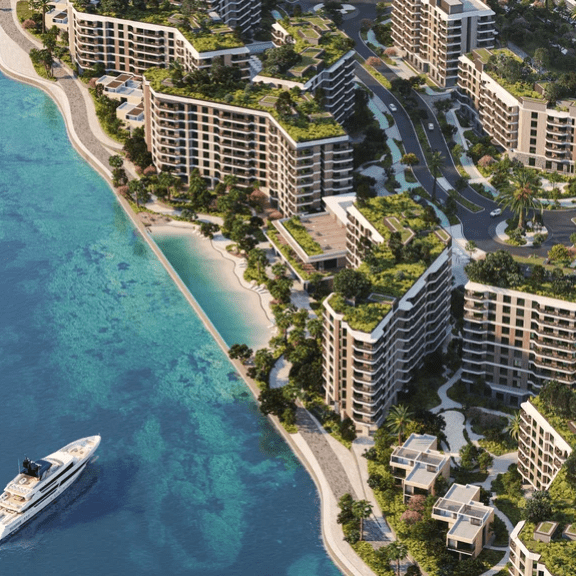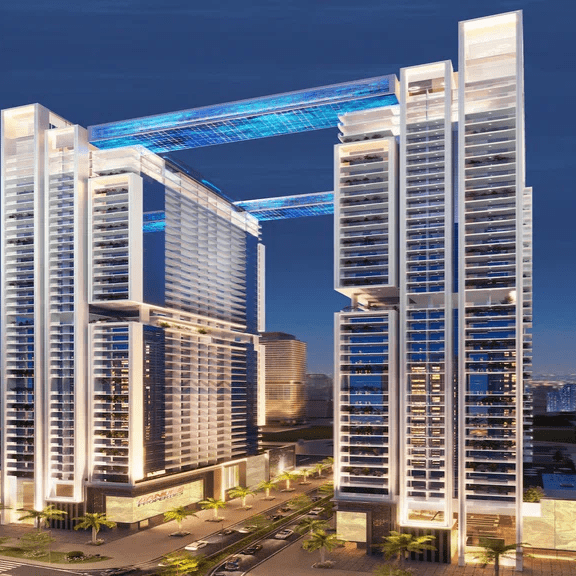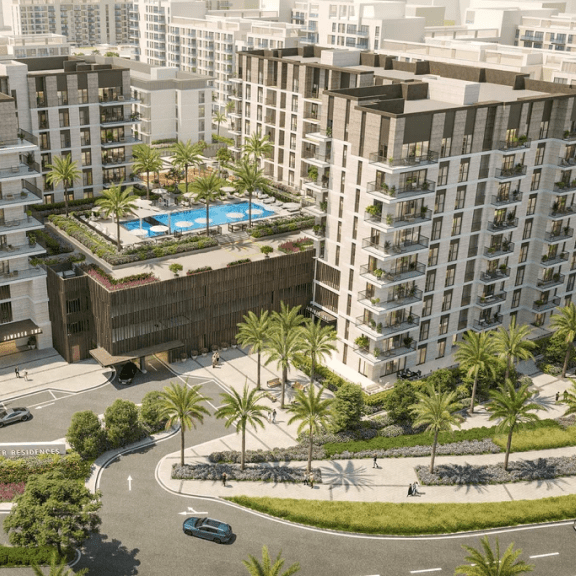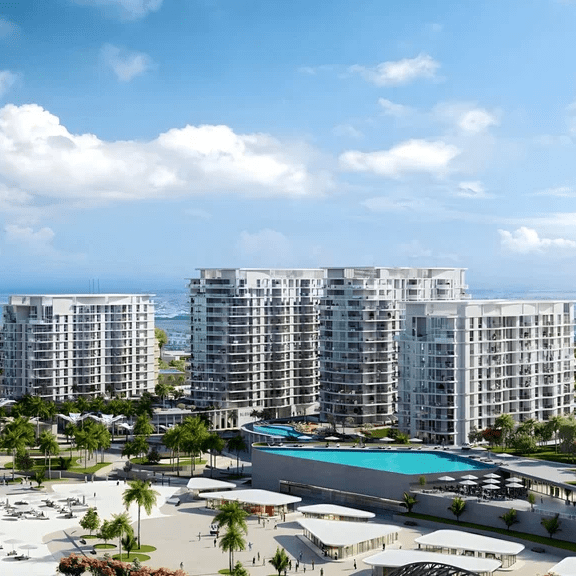There are several ways to buy residential property in the UAE that do not require a one-time payment. The most popular choice is a mortgage. Apart from that, both citizens of the UAE and foreigners can use a payment installment plan or use the rent-to-own method. More information on each method is provided below.
Mortgage Rates in Dubai
UAE banks tend to set loan terms only for the first three to five years of a loan and not for the entire loan period, since the economic reality may change in that time. One of the most frequently used instruments is the EIBOR interbank credit rate: after the fixed rate period (which cannot be longer than 5 years) finishes, it is replaced with an adjustable rate that is EIBOR-pegged. The bank’s margin rate, typically the same as the EIBOR rate, is added to it.
There are also options for mortgage loans in the UAE that are EIBOR-pegged by default. These interest rates are generally lower than fixed rate loans. However, EIBOR revises these rates every three months, meaning that upon signing a contract with the bank the credited party only knows the amount they need to pay for the first one to three months.
New buildings in the UAE
Some banks offer to merge the mortgage with a deposit or operating account. Any balance on that account reduces the debt by the corresponding amount. The interest is then applied to an already decreased debt.
For example, Rakbank offers a product called Home in One, which reduces the interest rate by almost 30%. It is worth remembering that the most considerable savings begin in the final months of loan repayment. These loans do not allow for repayment in advance and overdue payments are punished by a return to standard rates, among other sanctions.
Furthermore, the UAE has adopted special mortgage programs for "green construction." For example, HSBC offers a Green Home Loan with an adjustable rate where the bank margin is 0.25% lower than in similar standard loans. HSBC charges no commission for this loan arrangement.
These mortgages are available for houses that have a Gold or Platinum level LEED certificate. If the loan debtor provides sufficient proof that the property meets international sustainability standards, the bank can discuss the possibility of conducting the certification by its own team of experts.
Mortgage for Residents and Non-Residents
Buyers with residential visas receive better mortgage terms than non-residents.
Residents | Non-residents | |
The loan sum | Up to 80% of the property cost | Up to 50% of the property cost (60% in some banks) |
Mortgage rate | 3.5 to 4% | 4.5 to 5.5% |
Additionally, banks often offer special terms for residents: discounts for loan approval and arrangement fees, lower fixed rates as well as discounts for life insurance from partnering insurance companies.
General Terms for Applying for a Mortgage in the UAE
- The debtor must be between 21 and 65 years old.
- Loan periods range from five to 25 years. Note: the older the debtor, the shorter the loan period.
- Confirmed monthly income cannot be below 800 AED (approximately $3,000) for each family member after all loan payments. Note: the total of all loan payments cannot exceed 50% of the debtor's income.
- Mortgages are exclusively available for Freehold properties.
- On any property currently under construction, construction must be finished within two years from the moment of issuing the loan.
The Square (Housearch)
How to Take Out a Mortgage
- The borrower files a formal application to the bank and provides the following documents:
- income statements for the last six months;
- employer information (for employees) or the audit results for the last year (for entrepreneurs);
- bank account statements for the last six months;
- family status certificate. - The bank conducts a preliminary check, which typically takes about five days, and, if approved, the borrower gets a two-month window to find proper real estate.
- After the desired apartment or house is found, the borrower makes the initial payment and signs a document that proves his intention to acquire the property.
- Then the bank assigns an independent expert to appraise the actual cost of the property and make the final decision on the loan.
Extra Charges
The bank charges a commission for processing the application, appraising the property and sometimes for the loan arrangement. Moreover, in order to get the mortgage, both the property and the life of the borrower must be insured. Finally, the borrower has to pay a registration fee, a commission to the real estate agency, and a fee to the developer if they are buying an apartment in a new building.
ANWA (Houserach)
List of most common extra charges:
- The bank fee for processing the application is typically 0.5 to 1% of the property cost. Note: if an application is rejected, the bank refunds this fee to the borrower.
- Property assessment fee – 2,500 to 5,500 AED ($700 to $1,500).
- Property evaluation – around $1,000.
- Property insurance – 0.5 to 1% of its appraised value.
- The borrower's life insurance – 0.3% of the loan sum.
- Mortgage registration with the Land Department – 0.25% of the loan sum.
- Municipality registration fee – 2% of the property cost.
- Real estate agency fee – 2%.
- The developer fee – 5000 AED ($1,300).
Other Ways to Purchase Real Estate
There are two other popular ways to buy a home in Dubai without a one-time payment.
Installment Plan
Every UAE real estate developer has their own payment installment plans. You will find two such examples below.
The developer Nshama offers a 29.8 sq. m. studio apartment in a finished Dubai residential complex on two conditions:
- the price is 423,300 AED ($115,300);
- advance payment upon reservation – 10% of the property cost;
- the remaining 90% is paid within three years as part of a zero-interest installment plan.
Another developer, Jazeera Al Hamra, offers a one-bedroom apartment with a floor area of 55.3 sq. m. The house is built along the Arabian Gulf, in the Al Hamra Village resort complex (the city of Ras Al Khaimah), and the terms are the following:
- the price is 483,900 AED ($131,800);
- advance payment is 15% of the property cost (if the buyer is applying for a residential visa, the payment is 20%);
- the next payment is 10% and due in six months;
- the remaining 70% or 75% is divided into equal payments spread over 54 months.
Rent-to-Own
The rent-to-own plan allows one to gradually buy a property while making rent payments. The advance payment in this case starts at 5% of the property price.
In a rent-to-own plan, the rent is higher than market rates but one should keep in mind that, unlike most rents, these payments are counted as a payment towards the price of the property.
The Residences (Housearch)
Opening an Account in a UAE Bank
To make any of the aforementioned types of payment for a property, a buyer must open an account at a local bank. A non-resident must translate the following documents and provide them to the bank:
- passport;
- valid UAE visa;
- certificate of ownership for a residential property in the UAE or a rent contract;
- certificate from the employer confirming their position and salary (no less than 15,000 AED or $4,000) or charter documents (for company owners);
- bank statement from all accounts for the previous 6 months with a total turnover of funds of at least 25,000 AED ($6,800);
- information about the source of income.
The bank may also request a confirmation of the address of the applicant’s current main residence (usually a utility bill with the applicant’s name on it) as well as a reference letter from the bank that provided the bank statements.
Finally, to open an account, a non-resident must personally come to the bank. However, some banks allow buyers with a residential visa to open an account using the application.
Not all of the country’s banks are willing to work with non-residents. Recommended banks include Emirates NBD, RAK Bank, Abu Dhabi Islamic Bank, Emirates Islamic Bank as well as branches of international banks such as HSBC or Citibank.
In A Nutshell
A mortgage loan in the UAE is available for both residents and foreigners. However, the former will find more favorable terms, including a smaller down payment among other advantages. Mortgages in the UAE do have their peculiarities: as a rule, the banks set up terms for the first three to five years after which the interest rate may change. There are also several additional charges that may come up during a loan arrangement: a charge for reviewing the application, for property appraisal, and sometimes even for arranging the loan itself.
Cover photo: Kent Tupas (Unsplash)




